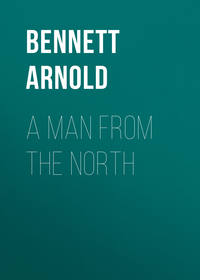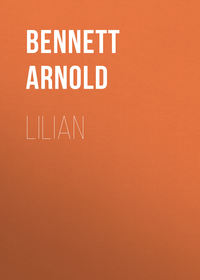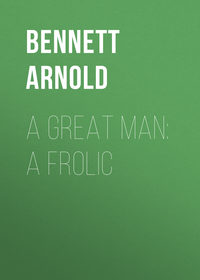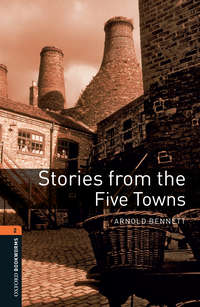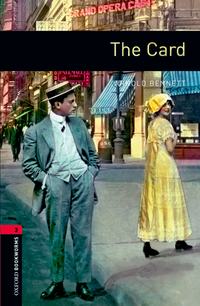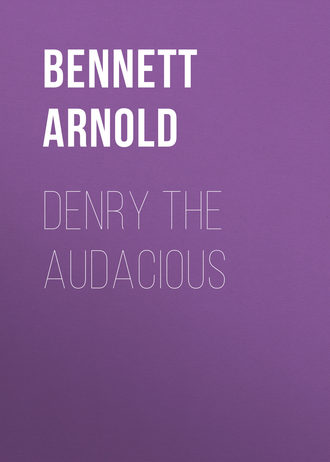 полная версия
полная версияDenry the Audacious
"I 've nowt for ye!" said the old woman, not moving.
"Come, come, now! That won't do!" said Denry. "Have a pinch of my tobacco!"
She accepted a pinch of his tobacco, and refilled her pipe, and he gave her a match.
"I 'm not going out of this house without half a crown at any rate!" said Denry blithely.
And he rolled himself a cigarette, possibly to keep warm. It was very chilly in the stuffy residence, but the old woman never shivered. She was one of those old women who seem to wear all the skirts of all their lives, one over the other.
"Ye 're here for th' better part o' some time, then," observed Mrs. Hullins, looking facts in the face. "I 've told ye about my son Jack. He 's been playing [out of work] six weeks. He starts to-day, and he 'll gi' me summat Saturday."
"That won't do," said Denry, curtly and kindly.
He then, with his bluff benevolence, explained to Mother Hullins that Mrs. Codleyn would stand no further increase of arrears, from anybody, that she could not afford to stand any further increase of arrears, that her tenants were ruining her, and that he himself, with all his cheery good will for the rent-paying classes, would be involved in her fall.
"Six and forty years have I been i' this 'ere house!" said Mrs. Hullins.
"Yes, I know," said Denry. "And look at what you owe, mother!"
It was with immense good-humoured kindliness that he invited her attention to what she owed. She tacitly declined to look at it.
"Your children ought to keep you," said Denry, upon her silence.
"Them as is dead, can't," said Mrs. Hullins, "and them as is alive has their own to keep, except Jack."
"Well, then, it's bailiffs," said Denry, but still cheerfully.
"Nay, nay! Ye 'll none turn me out."
Denry threw up his hands, as if to exclaim: "I 've done all I can, and I 've given you a pinch of tobacco. Besides, you ought not to be here alone. You ought to be with one of your children."
There was more conversation, which ended in Denry repeating, with sympathetic resignation:
"No, you 'll have to get out. It's bailiffs."
Immediately afterwards he left the residence, with a bright filial smile. And then, in two minutes, he popped his cheerful head in at the door again.
"Look here, mother," he said, "I 'll lend you half a crown if you like."
Charity beamed on his face, and genuinely warmed his heart.
"But you must pay me something for the accommodation," he added. "I can't do it for nothing. You must pay me back next week and give me threepence. That's fair. I could n't bear to see you turned out of your house. Now, get your rent-book."
And he marked half a crown as paid in her greasy, dirty rent-book, and the same in his large book.
"Eh, you 're a queer 'un, Mester Machin!" murmured the old woman, as he left. He never knew precisely what she meant. Fifteen – twenty years later in his career, her intonation of that phrase would recur to him and puzzle him.
On the following Monday everybody in Chapel Alley and Carpenter's Square seemed to know that the inconvenience of bailiffs and eviction could be avoided by arrangement with Denry the philanthropist. He did quite a business. And having regard to the fantastic nature of the security, he could not well charge less than threepence a week for half a crown. That was about forty per cent. a month and five hundred per cent. per annum. The security was merely fantastic, but nevertheless, he had his remedy against evil-doers. He would take what they paid him for rent and refuse to mark it as rent, appropriating it to his loans; so that the fear of bailiffs was upon them again. Thus, as the good genius of Chapel Alley and Carpenter's Square, saving the distressed from the rigours of the open street, rescuing the needy from their tightest corners, keeping many a home together when but for him it would have fallen to pieces, always smiling, jolly, sympathetic, and picturesque, Denry at length employed the five-pound note won from Harold Etches. A five-pound note – especially a new and crisp one, as this was – is a miraculous fragment of matter, wonderful in the pleasure which the sight of it gives even to millionaires; but perhaps no five-pound note was ever so miraculous as Denry's. Ten per cent. per week, compound interest, mounts up; it ascends; and it lifts. Denry never talked precisely. But the town soon began to comprehend that he was a rising man, a man to watch. The town admitted that, so far, he had lived up to his reputation as a dancer with countesses. The town felt that there was something indefinable about Denry.
Denry himself felt this. He did not consider himself clever, nor brilliant. But he considered himself peculiarly gifted. He considered himself different from other men. His thoughts would run:
"Anybody but me would have knuckled down to Duncalf and remained a shorthand clerk for evermore."
"Who but me would have had the idea of going to the ball and asking the Countess to dance? … And then that business with the fan!"
"Who but me would have had the idea of taking his rent-collecting off Duncalf?"
"Who but me would have had the idea of combining these loans with the rent-collecting. It's simple enough! It's just what they want! And yet nobody ever thought of it till I thought of it!"
And he knew of a surety that he was that most admired type in the bustling, industrial provinces – a card.
IV
The desire to become a member of the Sports Club revived in his breast. And yet, celebrity though he was, rising though he was, he secretly regarded the Sports Club at Hillport as being really a bit above him. The Sports Club was the latest and greatest phenomenon of social life in Bursley, and it was emphatically the club to which it behoved the golden youth of the town to belong. To Denry's generation the Conservative Club and the Liberal Club did not seem like real clubs; they were machinery for politics, and membership carried nearly no distinction with it. But the Sports Club had been founded by the most dashing young men of Hillport, which is the most aristocratic suburb of Bursley and set on a lofty eminence. The sons of the wealthiest earthenware manufacturers made a point of belonging to it, and, after a period of disdain, their fathers also made a point of belonging to it. It was housed in an old mansion with extensive grounds and a pond and tennis courts; it had a working agreement with the Golf Club and with the Hillport Cricket Club. But chiefly it was a social affair. The correctest thing was to be seen there at nights, rather late than early; and an exact knowledge of card games and billiards was worth more in it than prowess on the field.
It was a club in the Pall Mall sense of the word.
And Denry still lived in insignificant Brougham Street, and his mother was still a sempstress! These were apparently insurmountable truths. All the men whom he knew to be members were somehow more dashing than Denry – and it was a question of dash; few things are more mysterious than dash. Denry was unique, knew himself to be unique; he had danced with a Countess; and yet … those other fellows! … Yes there are puzzles, baffling puzzles, in the social career.
In going over on Tuesdays to Hanbridge, where he had a few trifling rents to collect, Denry often encountered Harold Etches in the tram-car. At that time Etches lived at Hillport, and the principal Etches manufactory was at Hanbridge. Etches partook of the riches of his family and, though a bachelor, was reputed to have the spending of at least a thousand a year. He was famous, on summer Sundays, on the pier at Llandudno, in white flannels. He had been one of the originators of the Sports Club. He spent far more on clothes alone than Denry spent in the entire enterprise of keeping his soul in his body. At their first meetings little was said. They were not equals and nothing but dress-suits could make them equals. However, even a king could not refuse speech with a scullion whom he had allowed to win money from him. And Etches and Denry chatted feebly. Bit by bit they chatted less feebly. And once, when they were almost alone in the car, they chatted with vehemence during the complete journey of twenty minutes.
"He is n't so bad," said Denry to himself, of the dashing Harold Etches.
And he took a private oath that at his very next encounter with Etches he would mention the Sports Club – "just to see." This oath disturbed his sleep for several nights. But with Denry an oath was sacred. Having sworn that he would mention the Club to Etches, he was bound to mention it. When Tuesday came he hoped that Etches would not be on the tram, and the coward in him would have walked to Hanbridge instead of taking the tram. But he was brave. And he boarded the tram. And Etches was already in it. Now that he looked at it close, the enterprise of suggesting to Harold Etches that he, Denry, would be a suitable member of the Sports Club at Hillport seemed in the highest degree preposterous. Why! He could not play at any games at all! He was a figure only in the streets! Nevertheless – the oath!
He sat awkwardly silent for a few moments, wondering how to begin, and determined to get it over. And then Harold Etches leaned across the tram to him and said:
"I say, Machin. I 've several times meant to ask you. Why don't you put up for the Sports Club? It's really very good, you know."
Denry blushed. Quite probably for the last time in his life. And he saw with fresh clearness how great he was, and how large he must loom in the life of the town. He perceived that he had been too modest.
V
You could not be elected to the Sports Club all in a minute. There were formalities; and that these formalities were complicated and took time is simply a proof that the Club was correctly exclusive, and worth belonging to. When at length Denry received notice from the "Secretary and Steward" that he was elected to the most sparkling fellowship in the Five Towns, he was, positively, afraid to go and visit the Club. He wanted some old and experienced member to lead him gently into the Club and explain its usages and introduce him to the chief habitués. Or else he wanted to slip in unobserved while the heads of clubmen were turned. And then he had a distressing shock. Mrs. Codleyn took it into her head that she must sell her cottage property. Now Mrs. Codleyn's cottage property was the backbone of Denry's livelihood; and he could by no means be sure that a new owner would employ him as rent-collector. A new owner might have the absurd notion of collecting rents in person. Vainly did Denry exhibit to Mrs. Codleyn rows of figures showing that her income from the property had increased under his control. Vainly did he assert that from no other form of investment would she derive such a handsome interest. She went so far as to consult an auctioneer. The auctioneer's idea of what would constitute a fair reserve price shook, but did not quite overthrow, her. At this crisis it was that Denry happened to say to her, in his new large manner: "Why! if I could afford, I 'd buy the property off you myself, just to show you…!" (He did not explain, to show her, and he did not perhaps know himself, what had to be shown.) She answered that she wished to goodness he would! Then he said wildly that he would, in instalments! And he actually did buy the Widow Hullins's half-a-crown-a-week cottage for £45, of which he paid £30 in cash and arranged that the balance should be deducted gradually from his weekly commission. He chose the Widow Hullins's because it stood by itself – an old piece, as it were, chipped off from the block of Mrs. Codleyn's realty. The transaction quieted Mrs. Codleyn. And Denry felt secure because she could not now dispense with his services without losing her security for £15. (He still thought in these small sums instead of thinking in thousands.)
He was now a property owner.
Encouraged by this great and solemn fact, he went up one afternoon to the Club at Hillport. His entry was magnificent, superficially. No one suspected that he was nervous under the ordeal. The truth is that no one suspected because the place was empty. The emptiness of the hall gave him pause. He saw a large framed copy of the "Rules" hanging under a deer's head, and he read them as carefully as though he had not got a copy in his pocket. Then he read the Notices, as though they had been latest telegrams from some dire seat of war. Then, perceiving a massive open door of oak (the club-house had once been a pretty stately mansion), he passed through it, and saw a bar (with bottles) and a number of small tables and wicker chairs, and on one of the tables an example of the Staffordshire *Signal* displaying in vast letters the fearful question: "Is your skin troublesome?" Denry's skin was troublesome; it crept. He crossed the hall and went into another room which was placarded "Silence." And silence was. And on a table, with copies of The Potter's World, The British Australasian, The Iron Trades Review, and the Golfer's Annual, was a second copy of the Signal again demanding of Denry in vast letters whether his skin was troublesome. Evidently the reading-room.
He ascended the stairs and discovered a deserted billiard-room with two tables. Though he had never played at billiards he seized a cue, but when he touched them the balls gave such a resounding click in the hush of the chamber that he put the cue away instantly. He noticed another door, curiously opened it, and started back at the sight of a small room and eight middle-aged men, mostly hatted, playing cards in two groups. They had the air of conspirators, but they were merely some of the finest solo-whist players in Bursley. (This was before Bridge had quitted Pall Mall.) Among them was Mr. Duncalf. Denry shut the door quickly. He felt like a wanderer in an enchanted castle who had suddenly come across something that ought not to be come across. He returned to earth, and in the hall met a man in shirt-sleeves – the Secretary and Steward, a nice homely man who said, in the accents of ancient friendship, though he had never spoken to Denry before: "Is it Mr. Machin? Glad to see you Mr. Machin! Come and have a drink with me, will you? Give it a name." Saying which, the Secretary and Steward went behind the bar, and Denry imbibed a little whiskey and much information concerning the Club.
"Anyhow, I 've been!" he said to himself going home.
VI
The next night he made another visit to the Club, about ten o'clock. The reading-room, that haunt of learning, was as empty as ever; but the bar was full of men, smoke, and glasses. It was so full that Denry's arrival was scarcely observed. However, the Secretary and Steward observed him, and soon he was chatting with a group at the bar, presided over by the Secretary and Steward's shirt-sleeves. He glanced around, and was satisfied. It was a scene of dashing gaiety and worldliness that did not belie the Club's reputation. Some of the most important men in Bursley were there. Charles Fearns, the solicitor who practised at Hanbridge, was arguing vivaciously in a corner. Fearns lived at Bleakridge and belonged to the Bleakridge Club, and his presence at Hillport (two miles from Bleakridge) was a dramatic tribute to the prestige of Hillport's Club.
Fearns was apparently in one of his anarchistic moods. Though a successful business man, who voted right, he was pleased occasionally to uproot the fabric of society and rebuild it on a new plan of his own. To-night he was inveighing against landlords – he who by "conveyancing" kept a wife and family, and a French governess for the family, in rather more than comfort. The Fearnses' French governess was one of the seven wonders of the Five Towns. Men enjoyed him in these moods; and as he raised his voice, so he enlarged the circle of his audience.
"If the bye-laws of this town were worth a bilberry," he was saying, "about a thousand so-called houses would have to come down to-morrow. Now there's that old woman I was talking about just now – Hullins. She 's a Catholic – and my governess is always slumming about among Catholics – that's how I know. She 's paid half a crown a week for pretty near half a century for a hovel that isn't worth eighteen pence, and now she's going to be pitched into the street because she can't pay any more. And she 's seventy if she 's a day! And that's the basis of society. Nice, refined society, eh?"
"Who's the grasping owner?" some one asked.
"Old Mrs. Codleyn," said Fearns.
"Here, Mr. Machin, they 're talking about you," said the Secretary and Steward genially. He knew that Denry collected Mrs. Codleyn's rents.
"Mrs. Codleyn is n't the owner," Denry called out across the room, almost before he was aware what he was doing. There was a smile on his face and a glass in his hand.
"Oh!" said Fearns. "I thought she was. Who is?"
Everybody looked inquisitively at the renowned Machin, the new member.
"I am," said Denry.
He had concealed the change of ownership from the Widow Hullins. In his quality of owner he could not have lent her money in order that she might pay it instantly back to himself.
"I beg your pardon," said Fearns, with polite sincerity. "I'd no idea!.." He saw that unwittingly he had come near to committing a gross outrage on club etiquette.
"Not at all!" said Denry. "But supposing the cottage was yours, what should you do, Mr. Fearns? Before I bought the property I used to lend her money myself to pay her rent."
"I know," Fearns answered with a certain dryness of tone.
It occurred to Denry that the lawyer knew too much.
"Well, what should you do?" he repeated obstinately.
"She 's an old woman," said Fearns. "And honest enough, you must admit. She came up to see my governess, and I happened to see her."
"But what should you do in my place?" Denry insisted.
"Since you ask, I should lower the rent, and let her off the arrears," said Fearns.
"And supposing she didn't pay then? Let her have it rent free, because she's seventy? Or pitch her into the streets?"
"Oh – Well – "
"Fearns would make her a present of the blooming house and give her a conveyance free!" a voice said humorously, and everybody laughed.
"Well, that's what I 'll do," said Denry. "If Mr. Fearns will do the conveyance free, I 'll make her a present of the blooming house. That's the sort of grasping owner I am."
There was a startled pause. "I mean it," said Denry firmly, even fiercely, and raised his glass. "Here's to the Widow Hullins!"
There was a sensation, because, incredible although the thing was, it had to be believed. Denry himself was not the least astounded person in the crowded smoky room. To him, it had been like somebody else talking, not himself. But, as always when he did something crucial, spectacular, and effective, the deed had seemed to be done by a mysterious power within him, over which he had no control.
This particular deed was quixotic, enormously unusual; a deed assuredly without precedent in the annals of the Five Towns. And he, Denry, had done it. The cost was prodigious, ridiculously and dangerously beyond his means. He could find no rational excuse for the deed. But he had done it. And men again wondered. Men had wondered when he led the Countess out to waltz. That was nothing to this. What! A smooth-chinned youth giving houses away – out of mere, mad, impulsive generosity!
And men said, on reflection: "Of course that's just the sort of thing Machin would do!" They appeared to find a logical connection between dancing with a Countess, and tossing a house or so to a poor widow. And the next morning every man who had been in the Sports Club that night was remarking eagerly to his friends: "I say, have you heard young Machin's latest?"
And Denry, inwardly aghast at his own rashness, was saying to himself: "Well, no one but me would ever have done that!"
He was now not simply a card; he was the card.
CHAPTER III. THE PANTECHNICON
I
"How do you do, Miss Earp?" said Denry, in a worldly manner which he had acquired for himself by taking the most effective features of the manners of several prominent citizens, and piecing them together so that as a whole they formed Denry's manner.
"Oh! How do you do, Mr. Machin?" said Ruth Earp, who had opened her door to him at the corner of Tudor Passage and St. Luke's Square.
It was an afternoon in July. Denry wore a new summer suit, whose pattern indicated not only present prosperity but the firm belief that prosperity would continue. As for Ruth, that plain but piquant girl was in one of her simpler costumes; blue linen; no jewelry. Her hair was in its usual calculated disorder; its outer fleeces held the light. She was now at least twenty-five, and her gaze disconcertingly combined extreme maturity with extreme candour. At one moment a man would be saying to himself: "This woman knows more of the secrets of human nature than I can ever know." And the next he would be saying to himself: "What a simple little thing she is!" The career of nearly every man is marked at the sharp corners with such women. Speaking generally, Ruth Earp's demeanour was hard and challenging. It was evident that she could not be subject to the common weaknesses of her sex. Denry was glad. A youth of quick intelligence, he had perceived all the dangers of the mission upon which he was engaged, and had planned his precautions.
"May I come in a minute?" he asked in a purely business tone. There was no hint in that tone of the fact that once she had accorded him a supper-dance.
"Please do," said Ruth.
An agreeable flouncing swish of linen skirts as she turned to precede him down the passage! But he ignored it. That is to say, he easily steeled himself against it.
She led him to the large room which served as her dancing academy, the bare-boarded place in which, a year and a half before, she had taught his clumsy limbs the principles of grace and rhythm. She occupied the back part of a building of which the front part was an empty shop. The shop had been tenanted by her father, one of whose frequent bankruptcies had happened there; after which his stock of the latest novelties in inexpensive furniture had been seized by rapacious creditors, and Mr. Earp had migrated to Birmingham, where he was courting the Official Receiver anew. Ruth had remained, solitary and unprotected, with a considerable amount of household goods which had been her mother's. (Like all professional bankrupts, Mr. Earp had invariably had belongings which, as he could prove to his creditors, did not belong to him.) Public opinion had justified Ruth in her enterprise of staying in Bursley on her own responsibility and renting part of the building, in order not to lose her "connection" as a dancing-mistress. Public opinion said that "there would have been no sense in her going dangling after her wastrel of a father."
"Quite a long time since we saw anything of each other," observed Ruth in rather a pleasant style, as she sat down and as he sat down.
It was. The intimate ecstasy of the supper-dance had never been repeated. Denry's exceeding industry in carving out his career, and his desire to graduate as an accomplished clubman, had prevented him from giving to his heart that attention which it deserved, having regard to his tender years.
"Yes, it is, isn't it?" said Denry.
Then there was a pause, and they both glanced vaguely about the inhospitable and very wooden room. Now was the moment for Denry to carry out his pre-arranged plan in all its savage simplicity. He did so.
"I 've called about the rent, Miss Earp," he said; and by an effort looked her in the eyes.
"The rent?" exclaimed Ruth, as though she had never in all her life heard of such a thing as rent; as though June 24th (recently past) was an ordinary day like any other day.
"Yes," said Denry.
"What rent?" asked Ruth, as though for aught she guessed it might have been the rent of Buckingham Palace that he had called about.
"Yours," said Denry.
"Mine!" she murmured. "But what has my rent got to do with you?" she demanded. And it was just as if she had said: "But what has my rent got to do with you, little boy?"
"Well," he said, "I suppose you know I 'm a rent-collector?"
"No, I did n't," she said.
He thought she was fibbing out of sheer naughtiness. But she was not. She did not know that he collected rents. She knew that he was a card, a figure, a celebrity; and that was all. It is strange how the knowledge of even the cleverest woman will confine itself to certain fields.




